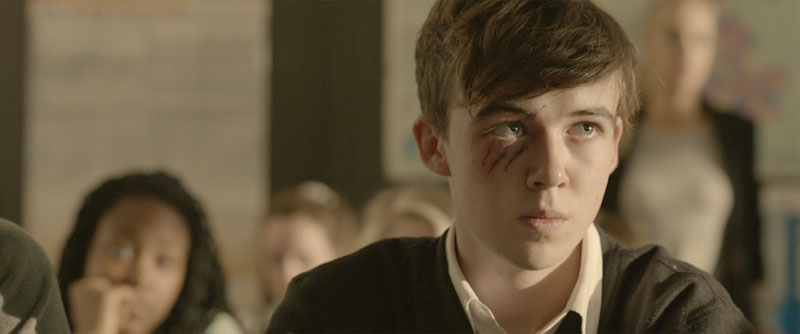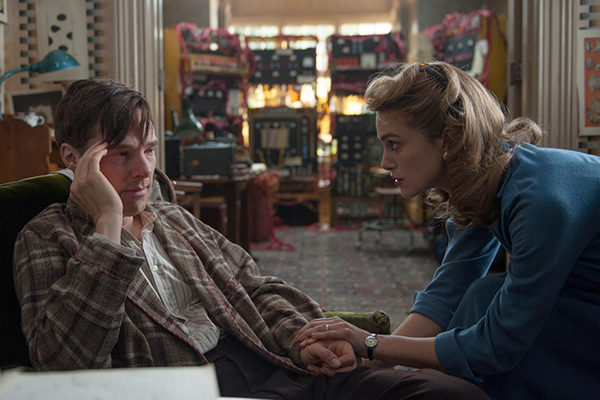“Sometimes it is the people who no one imagines anything of who do the things that no one can imagine.”
The Imitation Game, a film based on a true story and starring Benedict Cumberbatch and Keira Knightley has already been nominated for 8 Oscar awards. What is it that makes this film so moving and unforgettable?
Trailer:
Plot
Alan Turing (Cumberbatch), a young mathematician, is invited to join a team of Britain’s best cryptologists to crack the Nazi code, Enigma. Turing is a great mathematician but does not seem to play well with others. He does not seem to understand humor, sarcasm, and other social nuances. In addition, while the other code crackers are attempting to manually crack the secret code, Turing works on his own, building a computer (“Christopher”), which, he hopes, will be able to decode the messages instantaneously.
His refusal to follow orders and work with others nearly gets him kicked off the project. However, his team surprisingly stands up for him and offers to help. Turing hires a few additional people to help in building his computer and crack the code. Among the new code breakers is Ms. Joan Clarke (Knightley) who beat Turing’s record of solving a particularly difficult puzzle. Clarke is able to help Turing win over the affection and loyalty from the other members of his team by explaining to him, ”You’re going to need all the help you can get and they are not going to help you if they do not like you.”

Understanding other people seemed to have always been a challenge for Turing, especially when he was a little boy.

Bullied by his classmates for being odd and different, Turing didn’t have any friends except Christopher Morcom. Christopher took Alan under his wing, realizing that while social interactions were difficult for Turing, games and puzzles came naturally to him. It was Christopher that first introduced Alan to code cracking. Alan seemed to quickly pick up on the logical puzzles, complicated codes that needed to be solved, reflecting, “How is that different from talking?”
The two boys sent notes to one another is encrypted language. Alan eventually developed feelings for Christopher but before he was able to confront them Christopher died of bovine tuberculosis. Grief-stricken, Turing turned toward his work, eventually naming his computer after his first love. After figuring out a particular repetitive pattern, Turing was eventually able to crack the code, saving millions of lives.
Sadly all of his hard work was quickly forgotten when others discovered his sexual preference. Since homosexuality was illegal in Britain at that time, Turing was given a choice of prison or hormone therapy, which would greatly reduce his libido and affect his movement and cognitive abilities. After a year of this treatment, Turing committed suicide. It was not until 2013 (59 years after his death) that Queen Elizabeth II issued an official pardon for Alan Turing.
Diagnosis
Though this disorder is no longer officially in the DSM (the book that psychologists and psychiatrists use to make a clinical diagnosis), it appears that Alan Turing, as portrayed in this film, might have had Aspberger’s Disorder (now called Autism Spectrum Disorder).
People with Autism Spectrum Disorder (ASD) typically have a hard time with social interactions. Specifically, they might struggle with empathy (understanding other people’s emotions). Sometimes people mistakenly think that people with ASD do not have feelings and do not want ever want to have any social relationships. This is not true. People with ASD have feelings, just like anyone else, they just have a hard time understanding the feelings of others to the extent that people without ASD can.
In addition, people with ASD often struggle with social cues and reading body language, making eye contact, which might deter them from wanting to be around people, specifically, people they don’t know. However, many people with ASD do like having a reliable friend/companion. Alan Turing’s character makes a keen observation in the film, something that most of us take for granted, “When people talk to each other, they never say what they mean. They say something else and you’re expected to just know what they mean.”
Many people with ASD might exhibit some kind of an unusual or repetitive behavior or ritual. This might sometimes look similar to OCD (obsessive compulsive disorder). These behaviors are usually meant to take away the person’s anxiety and are a way of self-soothing. In addition, people with ASD are often exceptionally skilled in a particular task (such as computers or maps for example) and many tend to be extremely bright.

Sometimes people with ASD might struggle with movement coordination and might appear clumsy or rigid. In addition, some people with ASD might be sensitive to certain sounds and might struggle with large crowds or noisy environments. Some people with ASD also have sensory-processing disorder, a disorder where an individual might struggle with processing certain sensory cues, such as light, sound, hand-eye coordination, movement, touch, and others. Individuals with both ASD and sensory-processing disorder might be easily overwhelmed, especially by large crowds or gatherings and might have a hard time separating one sound from another (for example, they might struggle with separating the sound of one conversation from the overall noise in the room).
Because people with ASD are unique and different from people without it, they often fall victims to bullying, as was portrayed in the film. Bullying might not only emotionally scar someone for the rest of their life, it can also make it less likely that someone with ASD, who already struggles in socializing, would want to socialize in the future.
People with ASD might exhibit eccentric behaviors, which makes them different from others. The truth is that the uniqueness of these incredible individuals is what gave us the most incredible things we have today, such as technology, mathematics, the ability to study outer space, and many others. As Joan reminds Alan Turing in the film, “No one normal could have done that. Do you know, this morning I was on a train that went through a city that wouldn’t exist if it wasn’t for you. I bought a ticket from a man who would likely be dead if it wasn’t for you. I read up, on my work, a whole field of scientific inquiry that only exists because of you. Now, if you wish you could have been normal… I can promise you I do not. The world is an infinitely better place precisely because you weren’t.”

For more information on Asperger’s Disorder, check out my colleague, Dr. Frank Gaskill’s page and comic
If you have any questions about this post, please do not hesitate to contact me via Twitter @shadowquill, Facebook: https://www.facebook.com/Shadow.Scarletl, or by leaving a comment here.

Here’s my question. Revisiting the scene in the boys’ school dining hall . . . Turing seemed compelled to keep the green peas on his plate separated from the carrots. One of my school chums showed that behavior virtually daily, and I never understood.
Can you explain this behavior?
Can you explain why it was used in depicting Turing in the film ? ? ?
Thank you so much for your question 🙂
It is possible that Turing was displaying OCD-like tendencies. For some people, the idea of certain foods touching is either disgusting or otherwise very uncomfortable. Some folks with OCD go through that and some folks who are on the autism spectrum might experience that as well.
The most important thing is to be kind and supportive as opposed to judgmental when observing this behavior.
Thank you again. Hope you this was helpful and hope you have a wonderful day
Can I ask how the movie is related to encoding?